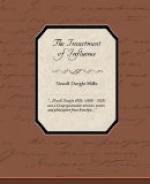With long patience also man has worked and waited as he has toiled upon his idea of religion. Rude, indeed, man’s hasty thoughts of the infinite. In early days the sun was God’s eye, the thunder his voice, the stroke of the earthquake the stroke of his arm, the harvest indicated his pleasure, the pestilence his anger. In such an age the priest and philosopher taxed their genius to invent methods of preserving the friendship and avoiding the anger of the Infinite. Daily the king and general calculated how many sheep and oxen they must slay to avoid defeat in battle. Daily the husbandman and farmer calculated how many doves and lambs must be killed to avert blight from the vineyard and hailstorms from the harvests. Observing that when the king ascended to the throne the slaves put their necks under his heel and covered their bodies with dust, in their haste the priests concluded that by degrading man God would be exalted. Prostrating themselves in dirt and rags, men went down in order that by contrast the throne of God might rise up. The mud was made thick upon man’s brow that the crown upon the brow of God might be made brilliant. Out of this degrading thought grew the idea that God lived and ruled for his own gratification and self-glory. The infinite throne was unveiled as a throne of infinite self-aggrandizement. Slowly it was perceived that the parent who makes all things move about himself as a center, ever monopolizing the best food, the best place, the best things, at last becomes a monster of selfishness and suffers an awful degradation, while he who sacrifices himself for others is the true hero.
At last, Christ entered the earthly scene with his golden rule and his new commandment of love. He unveiled God, not as desiring to be ministered to, but as ministering; as being rich, yet for man’s sake becoming poor; as asking little, but giving much; as caring for the sparrow and lily; as waiting upon each beetle, bird and beast, and caring for each detail of man’s life. Slowly the word God increased in richness. Having found through his telescope worlds so distant as to involve infinite power, man emptied the idea of omnipotence into the word GOD; finding an infinite wisdom in the wealth of the summers and winters, man added the idea of omniscience; noting




